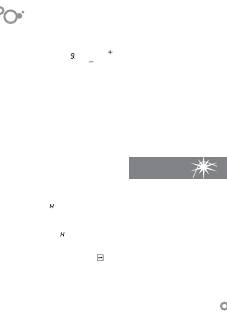Fagor 2VFT-320S: 0
0: Fagor 2VFT-320S

e n g l i s h
15
3
Maintenance and
cleaning
• Do not use a steam cleaner.
• Clean the surface of your hob regularly once
it has cooled down. Do not use abrasive
products or sponges. Clean with a damp cloth
and soapy water (3.1.1).
• Once a week, clean thoroughly with products
specifi cally designed for vetroceramic hobs.
We recommend VITRO-CLEN for cleaning and
maintaining your vitroceramic hob.
• Stubborn stains can be removed with the
glass scraper (3.1.2).
• If you accidentally burn some sugar, sugary
elements or plastic on the hob, remove it as
soon as possible with a scraper while it is still
hot. If this is not done, you may be left with
permanent marks.
• Use the blade of the scraper in perfect
condition; replace it if is damaged.
to cancel the rapid heating, press the icon of
the programmed element and select a new
power.
Models dfghjklmo:
Select an element and
set it at the maximum power by pressing
until a 9 and a dot are displayed (2.9.3).
Adjust the power by pressing
; levels
3 to 6 are recommended (2.9.4). After 5
seconds, fast heating is set and the power
will be displayed followed by a dot (2.9.5).
Once the maximum temperature has been
reached, the decimal point will disappear
and the element will continue operating in
the conventional way. To cancel the function,
press the key of the programmed element
and select a new power.
2.10 Vitros with controls.
Make sure that the
element you are going to activate is the
element you want to use (2.10.1). Turn
the control to the desired position and the
‘on’ light will come on (2.10.2) which also
indicates the residual heat when the element
is turned off.
On the models with double elements or a
large hotplate, turning the control to the left
will adjust a part of the element and turning
the control to the right will adjust the whole
element (2.10.3).
2.11 Turning the element off.
Select the power
0
of the element you want to turn off.
2.12 Residual heat.
After using the hob, the
elements will stay hot for some time, which
will vary according to the power selected
and a or a dot will be displayed on the
elements that are still hot.
Do not touch
these elements, as there is a risk of
burning yourself.
Caution:
If the power supply is cut off, when
it is restored, the icon will not be displayed
even if the cooking zone is hot. It is important to
remember this fact.
2.13 Locking function.
To prevent children from
handling the appliance. Press down the
key
for 3 seconds and this will activate the lock. To
unlock it, repeat the procedure.
Recommendations:
• Avoid knocking receptacles against the glass.
• Aluminium receptacles are not advisable as
they can stain the glass, unless they have a
stainless steel protective base.
• The heat elements should not be operated
without a receptacle.
• The base of the receptacle must be fl at and
dry.
• Make sure that the diameters of the
receptacles are larger than or the same as
the element to be used and place them in the
centre of the heat source.
• Try not to move the receptacles as this can
scratch the glass.
• Only use the appliance for cooking food. Do
not use the hob as a worktop.
• Do not apply cold water directly onto the hob
when it is hot.
Caution:
Intermittent operation of the cooking
zones is not a fault. They operate with longer
or shorter on and off periods depending on the
desired power.

e n g l i s h
16
5
Environment
4
Safety
The hob has been designed with protection of
the environment in mind.
Be environmentally aware.
Use the adequate
power for each cooking operation and select the
receptacles of a suitable size for the food you are
going to prepare. The heat transmission is best
when the base of the receptacle and the diameter
of the cooking zone are the same size.
When you have fi nished cooking, if you like you
can leave the receptacle where it is to make use
of the residual heat accumulated. This will save
energy.
Use a lid whenever you can in order to reduce the
heat lost through steam.
Electrical and electronic appliance waste
management.
Do not dispose of appliances by mixing them with
general domestic waste.
Take your hob to a special collection centre.
The recycling of domestic appliances avoids
negative consequences to our health, the
environment and enables us to save energy and
resources.
For further information, contact your local
authority or the establishment from where you
purchased your hob.
• The power circuit supplying the hob must have
an all-pole circuit breaker with at least 3mm
space between contacts.
• The hob must be installed by an authorised
installer, who shall follow the manufacturer’s
instructions and diagrams.
• The installation must be of the appropriate
size for the maximum power indicated on the
characteristics plate and the power socket with
the regulatory earth.
• If the cable is damaged, it must be replaced
by the post-sales service or similarly qualifi ed
personnel for safety purposes.
• The element is equipped with an inner
temperature limiter which turns the element off
in the event of the hob overheating.
• After each use, switch the element off using its
control.
• If the surface of the glass is cracked or broken,
unplug the appliance immediately to avoid the
possibility of an electric shock. Do not use the
hob until the glass has been replaced (4.1.1).
• If anything spills onto the control keys, the hob
will stop and emit a sound (4.1.2).
• If you press a sensor down for too long or there
is an object activating the sensors, the hob will
stop and emit a sound (4.1.3).
• Do not place receptacles with hot bases onto
the sensors; you can burn yourself when
pressing them (4.1.3).
• Keep young children well away; the heating
surfaces can be extremely hot when in use.
Use the locking system to prevent children from
playing with the controls.
• This appliance is not designed for use by
people with disabilities.
• Always stay nearby when cooking dishes or
food with fat or oil. Excessive heat could cause
them to catch fi re.
• If the hob is installed above a drawer, no
fl ammable objects must be stored inside.

